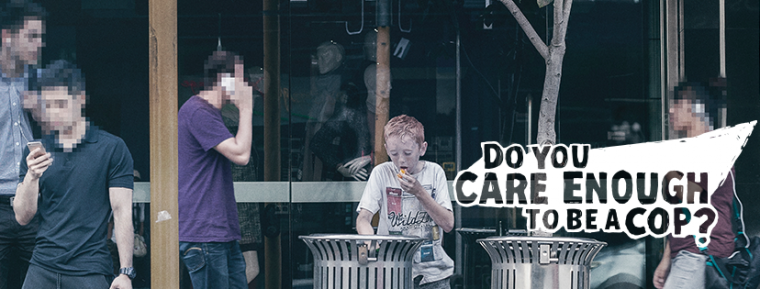Do you care enough to be a Christian?

The New Zealand Police Force filmed a child actor dressed as a homeless boy scavenging for food from a bin on a busy pavement for 35 minutes. In that time, about five hundred people had the opportunity to see the boy, yet just ten stopped to talk to him and offer help.
In a 1.43 minute clip, three people throw rubbish in the bin the boy is eating from, one man secretly takes a photo of him and it is only a group of teenage girls who stop to check that he is all right.
Hungry boy - Do you Care Enough to be a Cop?What would you do?#icareenough
Posted by NZ Police Recruitment on Sunday, 20 March 2016
The video is part of a recruitment campaign for the New Zealand Police, and asks the question: 'Do you care enough to be a cop?'
What if we replaced the word 'cop' with 'Christian'? Do you care enough to be a Christian?
Jesus tells the parable of the Good Samaritan as part of a response to the question, "What must I do to inherit eternal life?"
His answer: "'Love the Lord your God with all your heart and with all your soul and with all your strength and with all your mind', and 'Love your neighbour as yourself.'" The parable was told to explain what this term "neighbour" really meant.
Integral to our identity as a Christian – a follower of Christ – is both our love and devotion to Him and our love for our neighbour. We need both.
Jesus' bringing of the two together here is uncomfortable. It has been misinterpreted to mean that salvation is earned by works, rather than a free gift. The consequences of this have been dire, and inspired another trend of theology in which devotion to God is emphasised without reference to the cost that following Christ demands.
But Jesus' words preceding the parable draw the two together; it is not either/or, but both/and. Our salvation is not ours to earn – Jesus died and rose again so that we may live – yet our response to that gift is that we both love God and our neighbour.
From a posture of loving God, we are called to love other people. It is absolutely crucial to walking out our faith.
Those filmed walking past the little boy scavenging for food probably give to charity, they may well volunteer some of their time and try to shop responsibly. Yet when confronted with the human face of poverty, they look the other way.
The professionalisation of 'love' has allowed us to defer our duty to respond to situations and people in front of us to those who are paid – or scheduled – to do so. We might be responsible neighbours affecting change on a macro-level by paying our taxes, signing e-petitions and engaging with debates – and these things are to be encouraged. But are we loving neighbours?
The call to love our neighbours demands a personal, emotional engagement. It is not distant, it does not hide behind a computer screen, and it does not defer responsibility.
It requires we stop, look, and respond to the human faces of poverty in front of us. Not in order that we are saved, but because we have been.











